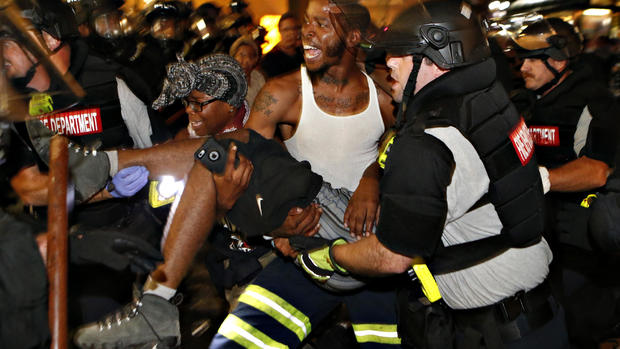Fatal police shooting in Charlotte raises questions about body cameras
CHARLOTTE, N.C. -- The fatal shooting of a black man by a police officer in Charlotte is only the latest shooting to raise questions about how the department uses body cameras.
Six people were fatally shot since body cameras were given to all patrol officers about a year ago. But the officers who fired the fatal shots in five of those cases -- including Keith Lamont Scott’s -- weren’t using the cameras.
The weekend release of police footage showing the shooting of Scott left questions in many people’s minds -- including whether he was holding a gun. The footage includes body camera video from another officer, but not the black officer who fatally wounded Scott.
Scott’s family and advocacy groups complain the department divulged only about three minutes of footage from two cameras. They have urged the police department to release all other video footage it has, as well as audio recordings of communications that could clarify how the situation unfolded. A media coalition is also requesting more footage.
Police Chief Kerr Putney has said the officer who shot Scott wasn’t wearing a body camera that day because he’s part of a tactical unit.
“Our tactical units don’t all have body-worn cameras at this point,” Putney told reporters on Saturday, adding they are to receive them in the future. He said was previously reluctant to make officers in high-risk operations wear cameras showing tactics and locations.
The department said plainclothes officers who saw Scott with a gun and marijuana left the area to put on vests identifying them as police before confronting him.
If the officers “had the foresight to put on their police vest, why did you not put on your body cam?” asked Corine Mack, president of the Charlotte NAACP chapter.
Susanna Birdsong, a legal policy expert for the American Civil Liberties Union, questioned whether the department is violating its own body camera policy instituted in April 2015.
The policy, according to the department’s site, states the cameras must be activated in situations including arrests and encounters with suspicious people. It doesn’t address whether tactical units must wear them.
Referring to the Scott case and others, Mack said she’s angry not all units have the cameras yet.
“It speaks to the culture of the police department that even when policies and procedures are put in place, that they feel they don’t have to follow them,” she said. “This is serious, that there is no record of a life being taken. ... People want to know why we don’t trust the police department?”
In three previous cases from December and January, the Mecklenburg County district attorney cleared officers who killed suspects who fired shots first. In one case, an officer wasn’t wearing a body camera because he was working off-duty security in uniform at a mall. A second case involved a tactical unit not equipped with body cameras. Footage existed in the third case but was poor quality, authorities said.
An April case being reviewed by the SBI involved SWAT members - one of the Charlotte units that hasn’t worn body cameras. A June case involved patrol officers, but multiple media outlets reported that the officers were not using body cameras.
Charlotte police didn’t respond to an email Monday asking about these cases.
Putney said Saturday he released portions of video pertinent to the shooting and hoped to release the rest after a State Bureau of Investigation probe. But he acknowledged that a new state law taking effect Oct. 1 will likely require a judge’s approval for further releases of footage.
Justin Bamberg, a Scott family attorney, said remaining video is vital to understanding exactly what transpired in a very short time.
“It is clear from the videos released that in the moments leading up to the shooting, Mr. Scott was non-aggressive, had his hands down by his side, appeared confused, and was passively walking backwards,” Bamberg said.
Geoff Alpert, a professor at the University of South Carolina, said that while body camera footage isn’t always conclusive, authorities should lean toward releasing it.
“Unless there’s a really compelling reason that should be explained, I don’t know why they wouldn’t release the video ... as they capture it,” Alpert said. “This is public safety, and keeping things from us doesn’t seem to be the appropriate way to move forward.”
Reda Burch, who stopped Sunday by a makeshift memorial near where Scott died, said she has watched the police videos but that authorities should release what other footage they have.
“Nobody’s life was being threatened. I didn’t see it from that tape, and if he (Putney) has other tapes that show those officers were in danger,” she’d like to be persuaded, Burch said. Lacking that, “it wasn’t justified. No, not at all.”
